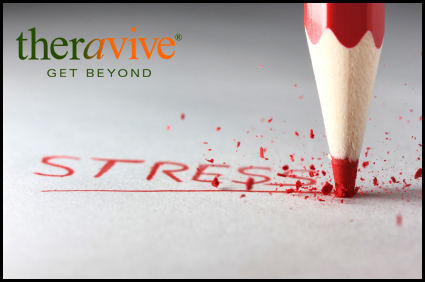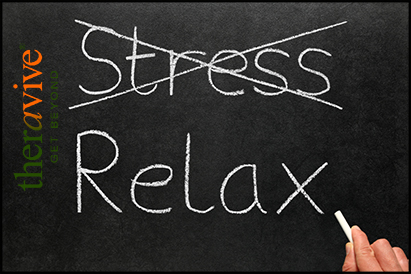 In honor of mental health awareness month, Mental Health America has identified several ways to promote good mental health by practicing a healthy lifestyle. Coping effectively with problems and stress is one way to experience better health and mental health outcomes.
In honor of mental health awareness month, Mental Health America has identified several ways to promote good mental health by practicing a healthy lifestyle. Coping effectively with problems and stress is one way to experience better health and mental health outcomes.
What is Stress?
Stress is defined as a state of mental or emotional strain or tension resulting from multiple, conflicting or difficult circumstances. Stress occurs when we experience conflicting demands, such as a sick child and deadlines at work. Stress also happens when we do not plan properly, take on too many responsibilities and/or make poor choices.
Stress is a natural part of the human condition. However, we can create our own stress and exacerbate the stresses in our lives unless we learn to be proactive, assertive and skilled at coping with problems. Our perceptions also determine what we find stressful and how we cope with stress.
How Does Stress Affect Our Mental and Physical Health?
Stress wreaks havoc on our bodies, minds and psyches. Our brain does not know the difference between a physical threat (someone pointing a gun at you) and a psychological threat (racing around to meet a deadline or frantically searching for your keys). The body’s response to either threat is a stress response that releases a flood of chemicals, including adrenaline and cortisol (the stress hormone) in the body. Our bodies respond like other animals to threats. When these chemicals are released, they trigger a fight, flight or freeze response. The cascade of adrenaline and cortisol quickens the pulse, raises blood pressure, heats up the muscles and kick-starts other physiological responses to prepare us for battle or to run for our lives.
When in the stress response mode, other bodily processes are disrupted. It is important to remember that in the fight/flight/freeze mode, the thinking part of the brain is not engaged. All the blood is sent to the limbs to respond to the threat, which means we are less able to access the part of the brain that is responsible for thinking and reasoning. This is why people who are ‘triggered’ emotionally are unable to have a rational conversation – it is not the time to try to reason with a person.
As you can imagine, those who experience long-term stress are at risk for a number of health problems. These include depression, autoimmune disorders, weight problems, problems sleeping, heart problems and others. Adrenal fatigue, when the body is depleted of cortisol, can also happen as a result of chronic stress. Adrenal fatigue includes symptoms of fatigue, confusion, inability to think clearly or make decisions, mood changes, sleep disturbance and others.
 8 Ways to Prevent and Manage Stress
8 Ways to Prevent and Manage Stress
· Be proactive. Manage your time and plan for the things you can. Obviously, some of our stress is related to the unexpected, but much of it is self-imposed. Control what you can by being proactive and prepared.
· Just say ‘no’. Boundaries are our way of taking care of ourselves. We set boundaries by being realistic about what we can and can’t do, given our priorities and limitations. A lot of stress is caused by taking on too much – prioritize and say no to things that are not necessary or feasible given your limitations.
· Make yourself a priority. Self care is crucial to good mental health. If you don’t take care of yourself, you can’t take care of your children, work or other responsibilities.
· Learn from the people around you. Model yourself after people you know or know of who manage their lives well, cope with stress effectively and practice good health and mental health. We can learn a lot from these people. They usually have good boundaries, practice good self care, utilize good time management and resolve conflict effectively. NOTE: They experience the same stressors as everyone else – they just handle them better by using skills and techniques, being proactive and prioritizing.
· Change your outlook. If you can develop a positive outlook, your perception of daily stressors will change. Our perceptions determine what we consider a threat and how we react. Learn to see the world differently and you will manage your emotions differently. If you need help with this, find a good cognitive-behavioral therapist.
· Make your choices count. All day, every day we make hundreds of small choices. Often, the smallest choice can lead to big results – positive or negative. Choose carefully to avoid stressful situations later. Choosing to hit the snooze button in the morning can lead to stress the rest of the day. Deciding whether to eat breakfast or not in an effort to save time can also create stress later. Choose wisely – be proactive.
· Do one good thing. Like the point listed above, if you get off to a bad start and your day is getting more stressful by the minute, you can turn it around. Stop. Think about one thing you can do to get control of your stress. It might be cancelling or rescheduling an appointment. Maybe you need to ask someone for help with a project or picking up your child from school. Look at your day rationally and do one thing to stop the madness.
· Let it go. Breathe – in and out. Tighten and release the muscles in your neck, shoulders, face, arms, legs and chest. By releasing the tension in your body, you can regain control of your emotions and racing thoughts.
A Word to Those Who Live From Crisis to Crisis
Don’t mistake other issues for normal stress. Many people who have undiagnosed ADHD, Anxiety or Bi Polar Disorder think the chaos that is their life is normal. It is not. If you find yourself creating stressful situations, talk to a professional to determine if there is an underlying condition that needs to be addressed. Life does not have to be so hard. If you need help with time management, prioritizing, planning, organizing, etc. ask someone to help you. If these are symptoms of an untreated condition, consider getting professional treatment. In some cases, medication may be necessary. In addition to meds, those with ADHD may need to learn techniques and strategies to compensate for their executive function deficits (planning, prioritizing, working memory, etc.).
_________________________________________________________________________________________________________________________________
1. Help Guide. (2014). Stress Symptoms, Signs and Causes. http://www.helpguide.org/mental/stress_signs.htm
2. Mental Health America. (2014). Stress: Coping with Everyday Problems. http://www.mentalhealthamerica.net/conditions/stress-coping-everyday-problems
About the Author
 LuAnn Pierce, LCSW
LuAnn Pierce, LCSWI am a clinical social worker, therapist and writer. Currently, I offer online therapy and coaching services to people in Colorado and Wyoming. As a provider for the CO Department of Vocational Rehabilitation and the National MS Society, my expertise in counseling people who have disabilities and chronic illness is considerable. I have written for About.com, DailyRx.com, Theravive.com, GoodTherapy.org, SelfHelpMagazine.com and contribute to several other online health and mental health sites.
Office Location:
19th & Dahlia
Denver, Colorado
80220
United States
Phone: 303-910-2425
Contact LuAnn Pierce, LCSW
Professional Website:
http://HireASocialWorker.com